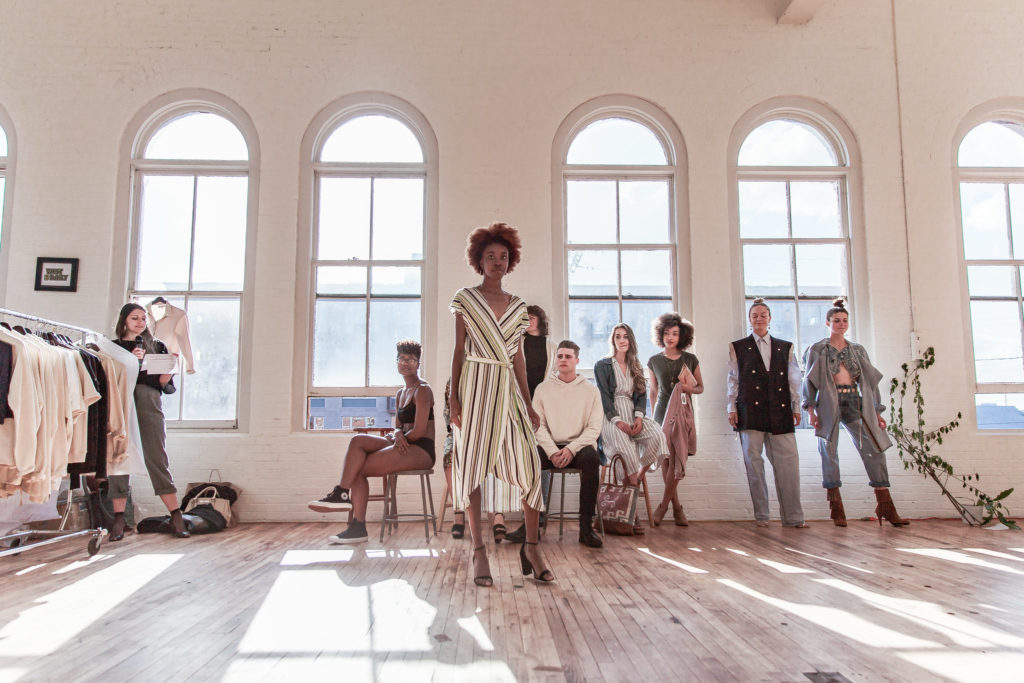I think many of us harbor hope that, despite the profound sadness and destruction it has caused, COVID-19 will create a better future for the living. “Unknowability is fertile land,” says Rebecca Solnit. But it remains to be seen if the pandemic will go down in history as “a momentary interruption, or… compel us to rethink how we organize our society and economy.” (Non-Profit Quarterly) Since we lack a collective national or global movement to stop “fiddling around the edges of a profoundly broken system,” (David Heinemeier Hansson) demanding governments put people and planet ahead of profit, I’ve turned to seeking smaller scale examples of positive indicators.
One industry hit hard by the pandemic in particular, the fashion industry, in fact seems compelled to transform itself. COVID-19 revealed how fragile the fashion supply chain really is, and revealed many designer’s discontentment with the state of their industry, which has been largely co-opted by fast fashion retail conglomerates. Fashion industry leaders are seeking solutions to reinforce their business and reverse the unsustainable trends their industry face.
“There are these openings…but an opening is just an opening. You still have to go through it and make something happen.”
– Rebecca Solnit
In a world where everyone is sounding the alarm 24/7 and everyone’s pointing their fingers at everyone else, where cooperation and rationality can seem practically non-existent, it was nothing but refreshing to see a voluntary call to action and show of unity throughout the global fashion industry to “slow down.”

Granted, the fashion industry has a reservoir of resources – financial and more – that enables it to organize itself well. So designers, retailers, executives and buyers are coming together to take a hard look at themselves and at the system in which they operate their businesses. “I think this is a start of a new era and we will never go back to the way it was before,” says Alexandre de Betak, founder of Bureau Betak, the production agency behind shows of labels including Christian Dior, Saint Laurent, and Rodarte. (Business of Fashion)
One example of this collaborative effort, facilitated by the Business of Fashion, is #rewiringfashion, a campaign to “rethink how the fashion industry could — and should — work.” Signatories to this proposal range from independent designers, to CEOs and retail executives from around the world.
“We are a group of independent designers, executives and retailers from around the world who came to the fashion industry along different paths but for the same reason: a belief in the beauty, imagination and craft that remain at the core of this business. And yet, we find ourselves facing a fashion system that is less and less conducive to genuine creativity and ultimately serves the interests of nobody: not designers, not retailers, not customers — and not even our planet. It’s time to slow down and rediscover the storytelling and magic of fashion.”
– Rewiring Fashion
Adjacent to the #rewiringfashion campaign is an Open Letter to the Fashion Industry, which shares a similar goal, to use this challenging, unprecedented time as an opportunity to re-imagine the future of fashion.
Adding to the momentum, global mass media corporation Condé Nast published its Five-Year Sustainability Strategy, a follow up to their 2019 Sustainability Statement. Critics will write this off as a public relations stunt amid coronavirus chaos, but I’m resisting the urge to do so. The fact that Condé Nast, owner of iconic media brands like Vogue, GQ, Vanity Fair and more, is documenting their sustainability strategy and holding itself publicly accountable to fulfilling their commitments is laudable.
Recently a group of us…agreed that the current environment although challenging, presents an opportunity for a fundamental and welcome change that will simplify our businesses, making them more environmentally and socially sustainable and ultimately align them more closely with customers’ needs.
– Forum Letter
Using findings from their first GHG (greenhouse gas) and Materials Assessment of 12 Condé Nast markets, Condé Nast outlines various commitments to reduce its carbon footprint. In my opinion, the most important of the four key areas outlined is the one which emphasizes “becoming a voice for change.” Here’s how it’s worded:
Firmly position Condé Nast and its brands as leading advocates for sustainability, with industry peers and audiences while strengthening expertise at corporate and editorial levels to further enhance our credibility and authority as a trusted voice in the public sustainability debate.
Condé Nast plans to “set higher standards for reporting on issues of climate change and sustainable fashion.” While I believe they’re on the right-ish track with this, unfortunately I don’t believe another media brand increasing their reporting on climate change is the answer. What the planet needs media brands like the ones under Condé Nast to do is name their role in stimulating consumer demand for new stuff. Calling to “eliminate all fossil-based, non-recyclable plastic packaging from publications” is wonderful, but using its mega influential platform to encourage consumers to not only shop more responsibly, but shop less, is even better. Condé Nast magazines generally leave readers “wanting,” tapped into that “hole” which we can never seem to fill with material goods…satisfaction always just of reach.

The global materials economy is in many ways based on this “hole.” We extract non-renewable natural resources to satisfy human needs and desires. Publications like Vogue, which Condé Nast owns, fuel this interminable desire for new clothing, accessories, travel to exotic locations, and more. All of this fuels the extractive, linear economy. The most effective way to slow the pace of environmental destruction, which leads to human-caused climate change, is to collectively slow our consumption. Every single one of us, every single day, but especially the Western ‘rich’ and particularly those living in the United States who use an inordinate amount of the planet’s resources, share this responsibility. “Our relationship to nature, and our responsibility to care for it, are essential learnings amid this pandemic,” writes Laird Borrelli-Persson for Vogue. If Vogue staff want to make a truly positive impact on the planet, tapping into this social-spiritual aspect of “less is more” and making this content as aspirational as their regular content is one pathway to fulfilling their objectives.
The iconic Anna Wintour, who has been at the helm of Vogue since 1988, “sees an opportunity for everybody to slow down, produce less, and really make the world over fall in love with the creativity and passion of fashion… and maybe have a little bit less of an emphasis on things moving so quickly and an emphasis always on what’s new.” I advocate for having a lot less of an emphasis on these things, but still appreciate her words. Fashion designers are, after all, at heart creative, artistic, eccentric individualists. So, is it so crazy to think the fashion industry will follow through with its plans? One can hope.
According to an earlier opinion article on Bloomberg, since the pandemic, “more companies indicate they are willing to put community and social responsibility ahead of short-term profits…demonstrating a stronger spirit of cooperation…including more widespread open source approaches to research, design and engineering problems.” This is exemplified by a fourth case I’ve found which supports fashion’s more sustainable future. Over 150 multinational corporations are signatories to the ‘Better Recovery’ statement, which urges governments “to align post-pandemic socio-economic recovery with climate science” and is the largest UN-backed CEO-led climate advocacy effort in history. Whether this remains a symbolic gesture or becomes a real movement with tangible results remains to be seen, but there is at least some modicum of evidence that large-scale enterprises want to move beyond “business-as-usual and work together in solidarity to deliver the greatest impact for people, prosperity and the planet.” (UN Global Compact)
Large businesses that have been ravaged by the pandemic were ill-prepared to deal with catastrophe. Having built their empires on shaky foundations, cutting corners, taking from the commons, exploiting workers, and passing true external costs to their customers, workers, and the planet they are now facing the music. But where there be dark must also be light. Countless organizations, ranging from local to global, have been laboring out of love for planet and people, gathering data, sharing their wisdom and documenting strategic proposals for decades. With this in mind, I implore businesses looking for sustainable solutions to look into the work of organizations like the Ellen MacArthur Foundation, The Savory Institute, and countless others which are leading the way in creating a circular economy that is fair to people and planet.


